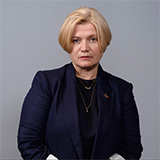24 червня 2011, 22:28
Регресія в демократії в Україну (Гельсінкська комісія США)

U.S. Helsinki Commission
www.csce.gov
(contact: Orest Deychakiwsky – orest.deychak@mail.house.gov)
Ukraine's Democratic Reversals
Christopher H. Smith (R-NJ), Member of Congress. [Rep. Smith is Chairman, Commission on Security and Cooperation in Europe (U.S. Helsinki Commission) and a senior member of the House Foreign Affairs Committee]
Statement
Congressional Record
June 23, 2011
Mr. Speaker, I rise to express my deep concern about the deterioration of democracy in Ukraine over the past 16 months, and the current Ukrainian leadership's use of politically-motivated selective prosecution to harass high-ranking officials from the previous government. The country's once-promising democratic future is in jeopardy. While we face many serious challenges in every region of the world today, nonetheless it is imperative that Washington focus attention on what is happening in Ukraine – especially given that country's vital role in the region.
As a long-time member and current Chairman of the Helsinki Commission, I have followed and spoken out on developments in Ukraine since the early 1980's, when the rights of the Ukrainian people were completely denied and any brave soul who advocated for freedom was brutally persecuted.
Mr. Speaker, for nearly two decades, independent Ukraine has been moving away from its communist past while establishing itself as an important partner to the United States. Both the executive branch and Congress, on a bipartisan basis, have provided strong political support and concrete assistance for Ukraine's independence and facilitated Ukraine's post-Communist transition. In the wake of the 2004 Orange Revolution, Ukraine even became a beacon of hope for other post-Soviet countries, earning the designation of "Free" from Freedom House – the only country among the 12 non-Baltic former Soviet republics to earn such a ranking. And while many of the promises of that revolution have sadly gone unfulfilled, one of its successes had been Ukraine's rise from "Partly Free" to "Free," reflecting genuine improvements in human rights and democratic practices.
Under President Viktor Yanukovych, elected in February 2010, this promising legacy may vanish. Today we see backsliding on many fronts, which threatens to return Ukraine to authoritarianism and jeopardizes its independence from Russia. Among the most worrisome of these trends are: consolidation of power in the presidency which has weakened checks and balances; backpedaling with respect to freedom of expression and assembly; various forms of pressure on the media and civil society groups; attempts to curtail academic freedom and that of institutions and activists who peacefully promote the Ukrainian national identity; and seriously flawed local elections. Meanwhile, endemic corruption – arguably the greatest and most persistent threat to Ukrainian democracy and sovereignty – as well the weak rule of law and the lack of an independent judiciary, which were not seriously addressed by the Orange governments, have only become more pronounced under the current regime.
Moreover, in recent months, we have seen intensified pressure on opposition leaders, even selective prosecutions of high-ranking members of the previous government. The vast majority of observers both within and outside Ukraine see these cases, which have targeted former Prime Minister Yuliya Tymoshenko and former Interior Minister Yuriy Lutsenko among others, as politically- motivated acts of revenge, which aim to remove possible contenders from the political scene, especially in the run-up to next year's parliamentary elections.
Mr. Speaker, the Helsinki Commission has closely monitored these troubling trends as have the U.S., other Western governments, and the European Parliament and Council of Europe. Unfortunately, the Ukrainian authorities have largely downplayed concerns voiced by the European Union, which they aspire to join someday, and by the United States, with which Kyiv professes to seek better relations.
The U.S. also desires enhanced bilateral ties. Yet, moving in the wrong direction on human rights, democracy and the rule of law decidedly works against strengthening U.S.- Ukrainian relations. More importantly, the erosion of hard-won democratic freedoms weakens Ukraine's independence and harms the people of Ukraine, who have endured a painful history as a captive nation over the course of the last century. Indeed, as Ukraine this week marks the 70th anniversary of the brutal Nazi invasion, we mourn the loss of life and untold human suffering of that horrific war.
Against this backdrop of devastation wreaked by totalitarian regimes in the 20th century, Ukrainians deserve to have the promise of democracy made possible by their independence fully realized.
A few days ago, President Yanukovych said that he would take into account the criticisms in Freedom House's recent "Sounding the Alarm: Protecting Democracy in Ukraine" report. His promise is encouraging, but words alone are not enough. All friends of Ukraine should measure his words by actual and meaningful changes that improve the state of democracy and human rights for the Ukrainian people.







